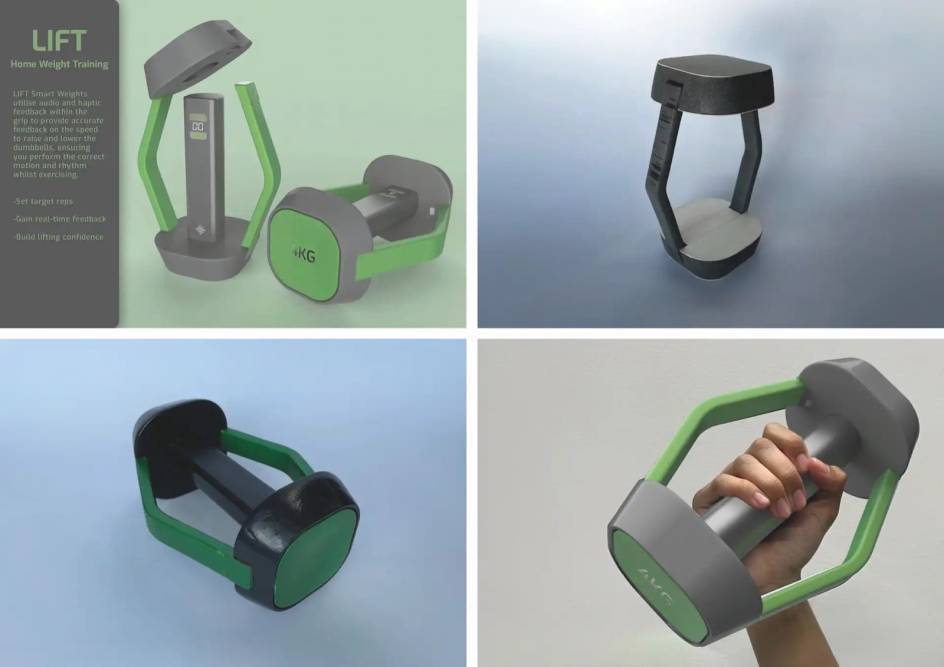The sky's the limit for product design graduate Calum Gambrill

Calum Gambrill graduated from Ravensbourne in 2020 on the BA (Hons) Product Design course. After winning the New Designer's Award earlier in the year and already creating a buzz around his work, he was contacted by the Global Graduate Design Show to ask if he would like to submit some of his work.
The Global Design Graduate Show is a prestigious event which showcases work from the brightest design graduates from across the world, and this year was sponsored by fashion powerhouse, Gucci. For Calum, the nomination was proof that despite the limitations of the pandemic and having little access to university facilities, with a good idea and perseverence, the sky's the limit. Despite not picking up a win at this year's competition, the nomination is a testament to his unrelenting hard work.
We caught up with Calum to discuss his award nominations, the trials and tribulations of completing his third year during the pandemic, and his ambitious plans for the future.
hide

How did you initially hear about the Global Design Graduate Show?
I got an email asking if I’d like to submit work. Actually, I got two emails relating to two different projects: one for my final major project and one for one of my projects from my second year.
I had a look at the platform and realised it was a pretty big deal. Obviously, I was impressed to see that the competition was sponsored by Gucci too – that was quite eye-catching. So that was encouraging, given the potential exposure it could give me. So I went ahead and applied for it and chose to submit work from my final major project, which I completed in my third year.
How did they know to get in touch with you?
A lot of my work is now online, like on my Behance and my portfolio is on my LinkedIn, so I guess they must have found me through that.
I also recently won the New Designers Award. The New Designers Award is a competition that every design university in the country is involved in. It champions design talent and presents the work of 3,000 hand-picked graduate design talents from around the UK.
Can you tell us a bit more about this award?
I won an award for some work I’d done with Ford, the automotive company. The project was to help people with mobility issues commute around big cities such as London.
I created a self-driving taxi for people with restricted mobility. The concept which I named ‘Embark’ was envisioned to be an accessible and inclusive taxi service. It utilises a dedicated app and a fleet of electric self-driving vehicles and the user can hail one down with the app, then they can enter via a side door ramp.
Can you tell us about the project you submitted for the Global Design Graduate Show?
So this was for my third major project, which was completed in very restrictive conditions because of the pandemic. The product, in a nutshell, is to help people improve their lifting dexterity when it comes to lifting weights. So it does a lot of things; it can notify you if you are holding the weights in the right place and lets you know the right speed and rhythm to aim to maintain.
It works to ensure you don’t over exercise or under exercise. When it comes to lifting weights, a lot of people tend to get it wrong. They think that it is all about lifting weights as many times as you can in a short time or just multiple times a day to gain muscle, but that’s not the case.
So using these weights can really help to educate you on the best way to exercise while also improving your dexterity and confidence. It is a way of ensuring you don’t do too much or too little. The user can set targets too, so they can work towards those personal goals. And lifting isn’t just for arms either, there're all sorts of exercises you can do with it – you can use them for your shoulders, your legs, etc. I also designed this small app that comes with it that the user can use and can customise it to get a full-body workout from it.
The weights themselves are meant to be used in the home. They are quite light, only about 4kg, so they are very convenient to use in the home. If you can become confident in using them, then you can gradually and safely move on to using heavier weights and then you’ll know the correct way to use them.
Also, in terms of the aesthetics, they have been designed to look more for fitting for the home environment. I think a lot of weights tend to look quite industrial, but these hopefully look sleeker and more at home in a domestic setting.
Can you tell us a bit about the design process?
I basically just sent across my entire design process that I submitted for my final major project, this included all the early research. In the beginning stages of a project, it’s a lot of problem solving and finding solutions. Then you narrow this down to find the fit for the particular kind of audience or end user.
In terms of prototyping, because the workshop wasn’t open in the building, I was quite restricted in what I could do. Usually, you would create the initial blueprint with card or blue foam and then move onto 3d printing, but that whole stage was cut out. Instead, I used lots of materials I had easy access to at home, like toilet roll and breakfast cereal boxes. I was getting my brother to lift weights for me to examine how people lift weights and then just doing lots of research on YouTube, etc. I learnt so much about the different types of exercises that you can do with weights. I didn’t realise that they were so versatile.
How did you feel about the nomination?
To be honest, it was a surprise to hear from them. I wasn’t entirely happy with the final results of the project myself. Mainly because of the limitations we had in terms of not being able to use the workshop and go into the university building as we usually would because of the pandemic.
Usually, a lot of the planning stages would involve thinking about the physical fit and creating the prototype, but that wasn’t possible in the pandemic. But it just goes to show that despite the limitations, you can create something that has real value and is appreciated by others. Initially, I wasn’t even planning to add this project to my portfolio because, as I mentioned, I just wasn’t sure whether I was happy with it or not – I thought some of my second-year projects were actually better.
Do you have any advice for any design students wondering whether to put their work out there?
I would say don’t be put off if you aren’t entirely happy with a piece of work, because you don’t know how other people will react. Obviously, you are naturally hyper-critical of your own work, but that doesn’t mean that others will be. Just be brave and put it out there and see what happens. Your work doesn’t define your worth, so just take the risk and you will probably be pleasantly surprised.
What have you been doing since you graduated?
So after graduation, I went straight into a two-month internship with a start-up called Studio Exception that specialises in accessible and inclusive design. They work to make products and services more accessible to people that are marginalised because of their disabilities. That was a great experience, but it was entirely remote and it was more user experience (UX) design and a lot of research.
Now I’m working on a television show for Sky Arts, in front of the camera. I’m not sure how much I’m able to tell you about it, I can give you the basic premise of it though. Essentially, it is like British Bake Off but for designers – so instead of baking a cake it’s like designing a chair or a lighting fixture or something like that.
It’s so much fun to be involved in that – that’s what I’m still doing currently. I think we are about 60/70 per cent through filming. It’s been so good to work next to people in a physical space and to have that real human interaction again. I’m hoping I can get some decent exposure from it. I’m actually the youngest contestant and so hopefully it will work in my favour that I’m a graduate designer competing on a show with other much more experienced designers. My plan after I graduated was to intern at four different places, so I still have three to go. Although I guess I could count the television show as an internship, as I’m learning so much from the other contestants.
Check out more of Calum's work:




